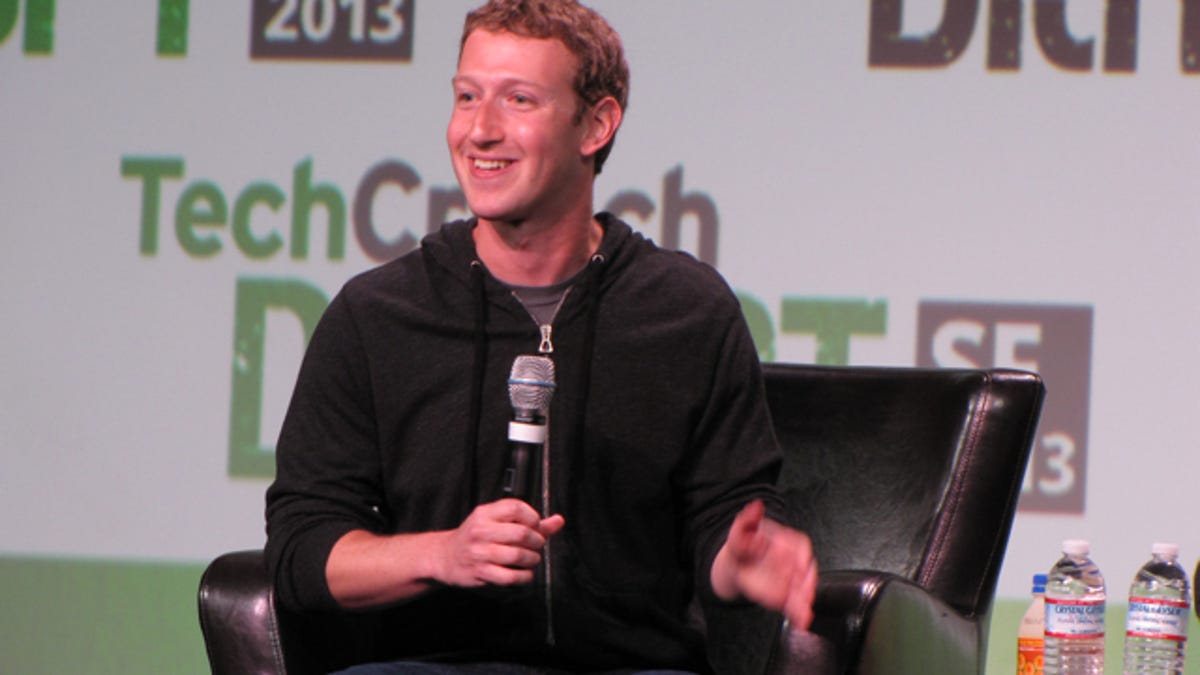Zuckerberg touts Facebook's mobile strength, says US 'blew it' on NSA
The confident CEO tells the TechCrunch Disrupt audience that the social-networking giant has figured out the mobile revenue equation. He also reveals what he thinks about the NSA scandal.

SAN FRANCISCO -- A year after he used his TechCrunch Disrupt talk to calm Wall Street fears, Mark Zuckerberg returned to that stage, a resurgent stock price fueling the Facebook CEO's confident attitude.
Zuckerberg also said that the U.S. government "blew it" during the recent National Security Agency scandal.
During a Disrupt "fireside chat" on Wednesday with TechCrunch co-founder and angel investor Michael Arrington, Zuckerberg spoke both directly to the packed hall hanging on his every word and to Wall Street investors looking for clues to the social-networking giant's future direction.
On the same day that Facebook's stock hit a new all-time high of $45.09 -- before settling in at $45.05 -- Zuckerberg, wearing his standard outfit of a T-shirt, hoodie, and jeans, touched on a wide range of issues, including having already surpassed a billion users, and Facebook's long-term mission of connecting "the next 5 billion" people, a goal that's harder, he said, because most of them don't have Internet access.
Zuckerberg also said later in the interview that one of the things he -- and Facebook -- is most focused on is helping to figure out ways to bring Internet connectivity to the billions of people without access.
But Facebook's users surely have Internet connectivity. And there are a lot of them. Zuckerberg said that the latest numbers showed that there are currently 1.15 billion monthly active Facebook users, with 699 million daily active users.
When Facebook's 2012 initial public offering quickly went awry, with its stock price tanking, there was no shortage of critics eager to pillory the company for a haphazard strategy, especially with regards to mobile. But since its second-quarter earnings in July, the stock is up 70 percent, in large part because investors now seem convinced that Facebook can make money off its more than 800 million mobile users.
Some would argue that Facebook's turnaround began at Disrupt a year ago when Zuckerberg took charge of his onstage interview, focusing it on the company's mobile strategy. He may have surprised many in attendance that day, given deep suspicions on Wall Street and throughout Silicon Valley that Facebook had no clue how to monetize mobile, by saying, in no uncertain terms, that it had become "a mobile company."
Now, that statement seems much less far-fetched. In its July earnings report, Facebook said that fully 41 percent, or about $656 million, of its second-quarter advertising revenue of $1.6 billion had come from mobile. Most analysts had predicted a number about $200 million less than that.
Today, Zuckerberg said that while a recent report showed that desktop users spend 1 in 7 minutes on Facebook, that number is 1 in 5 on mobile. And that doesn't count the amount of time people spend on Instagram, which Facebook owns, and which came in second in the report in terms of the amount of time people spend on different sites.
Zuckerberg readily acknowledged that Facebook was not in a good position to grow its user base -- and revenue -- on mobile last year, but that over the last year, it has focused on doing things in the right order. And it's clearly paying off.
Arrington also spent a substantial amount of time during the interview asking Zuckerberg about less business-focused ideas. For example, he asked the Facebook CEO for his opinion about the NSA scandal. "I think it's my job and our job to protect everyone who uses Facebook, and all the data they share with us," Zuckerberg said. "It's the government's job to protect us and our freedoms, and I think they did a bad job of balancing those things...They blew it, communicating the balance of what they were going for."
He also said that when the government said the day after the NSA scandal broke that it wasn't spying on Americans, he felt that, "Oh, really, that's helpful for companies trying to do business in other countries. So I think that's really bad."
Zuckerberg said that Facebook has been pushing hard for transparency in an attempt to be able to tell its users how many requests for information it has gotten from the government. He said he wanted people to know whether that number was in the thousands or millions. As a result, he explained, Facebook is now able to say that that number is closer to 1,000, and definitely not millions.
Arrington also asked Zuckerberg, as he did Yahoo CEO Marissa Mayer, and others during Disrupt, who should be Microsoft's next CEO. Zuckerberg wouldn't say, but did allow that Microsoft co-founder Bill Gates had been his hero when he was growing up, particularly because of Microsoft's ability to reach its goal of helping get personal computers on nearly everyone's desks.

